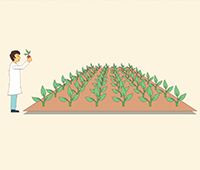11月2日,华中农业大学园艺植物生物学教育部重点实验室在The Plant Journal在线发表了题为“Alternative splicing triggered by the insertion of a CACTA transposon attenuates LsGLK and leads to the development of pale-green leaves in lettuce”的研究论文,该论文通过正向遗传学的方法克隆了控制莴苣叶色变异的基因LsGLK,并发现其下游CACTA转座子插入导致的可变剪接是形成莴苣叶浅绿色性状的遗传基础。
莴苣是世界上重要的蔬菜作物之一。莴苣群体内具有丰富的叶色变异,这主要是由花青素和光合色素的含量和比值不同造成的。然而,莴苣叶色由多个位点调控,其变异的遗传分子机理尚不清楚。课题组之前系统阐明了莴苣花青素积累的遗传机理,并将研究成果发表在Nature Communications (Zhang et al., 2017)和Plant Biotechnology Journal (Su et al., 2019)杂志上。在该论文中,课题组解析了莴苣叶片中光合色素含量变异的遗传基础。

利用连锁分析克隆LsGLK基因
在本次研究中,课题组利用134份包含野生莴苣(Lactuca serriola)和栽培莴苣(Lactuca sativa)材料的多样性群体,对叶片的光合色素含量进行测定,确定了莴苣群体中不同栽培类型间光合色素含量的变异特征。与野生莴苣相比,栽培莴苣的光合色素含量显著降低。而在各栽培类型中,油用莴苣的光合色素含量最高,散叶生菜的光合色素含量最低。这表明莴苣在驯化和改良分化过程中伴随着光合色素含量的变异。

CACTA转座子插入LsGLK基因并导致可变剪接
通过全基因组关联分析,该研究鉴定到一个与光合色素(叶绿素a、叶绿素b、叶绿素a+b、类胡萝卜素以及总光合色素)含量变异显著相关的主效QTL。课题组进一步通过构建双亲群体,利用BSR-Seq和图位克隆的策略,将此位点精细定位到4号染色体5,375 bp区段内,并获得了一个编码GARP类型转录因子的基因LsGLK。转基因互补验证了该基因对光合色素含量的调控作用。在浅绿植株中,该基因终止密码子后10 bp处插入了一个长度为7,434 bp的CACTA类转座子,在转座子后又有第3-6四个外显子的复制。此外,CACTA类转座子的插入导致LsGLK基因发生可变剪接,大部分转录本丢失了第六个外显子,只有6%的转录本未改变编码区并可翻译为功能蛋白。与深绿植株相比,浅绿植株中转座子的插入没有改变GLK基因的表达量。然而,由于可变剪接,产生了大量的非功能性转录本,相当于降低了LsGLK基因的表达,导致植株叶浅绿色性状。
课题组进一步利用转座子的插入开发分子标记并重新进行关联分析。结果发现,该转座子的插入能够解释莴苣自然群体不同类型光合色素含量20.9%-33.2%的表型变异,这表明该位点是导致莴苣自然群体中叶绿色深浅变异的主效位点。最后,进化分析表明转座子的插入发生在莴苣驯化过程中。在莴苣分化为各个栽培类型的过程中,GLK的不同基因型被人们选择并在各栽培类型中固定下来。
该研究利用关联分析和连锁分析相结合的策略,成功克隆了控制莴苣叶绿色深浅变异的基因,阐明了莴苣光合色素含量变异的遗传机理,发现了转座子对植物丰富的表型变异具有重要贡献,研究结果为莴苣叶色的选育提供了方法指导和理论依据。
园艺植物生物学教育部重点实验室博士毕业生张磊(现工作单位:江苏师范大学)为论文第一作者,陈炯炯副教授为论文通讯作者。该研究得到了国家重点研发计划、国家自然科学基金、中央高校基本科研业务费专项资金等项目的资助。
【英文摘要】
Lettuce is one of the most important vegetable crops in the world. As a leafy vegetable, the polymorphism from dark to pale green of lettuce leaves is an important trait. However, the genetic and molecular mechanisms underlying such variations remain poorly understood. In this study, one major locus controlling polymorphism of dark- and pale-green leaves in lettuce was identified using genome wide association studies (GWAS)。 This locus was then fine-mapped to an interval of 5,375 bp on chromosome 4 using a segregating population containing 2,480 progeny. only one gene, homologous to the GLK genes in Arabidopsis and other plants is present in the candidate region. A complementation test confirmed that the candidate gene, LsGLK, contributes to the variation of dark- and pale-green leaves. Sequence analysis showed that a CACTA transposon of 7,434 bp was inserted 10 bp downstream of the stop codon of LsGLK, followed by a duplication of a 1,826-bp fragment covering exons 3-6 of the LsGLK gene. The transposon insertion did not change the expression level of the LsGLK gene. However, because of alternative splicing, only 6% of the transcripts produced from the transposon insertion were wild-type transcripts, which led to the production of pale-green leaves. An evolutionary analysis revealed that the insertion of the CACTA transposon occurred in cultivated lettuce and might have been selected in particular cultivars to satisfy the diverse demands of consumers. In this study, we demonstrated that a transposon insertion near a gene may affect its splicing and consequently generate phenotypic variations.
论文链接:https://onlinelibrary.wiley.com/doi/abs/10.1111/tpj.15563







